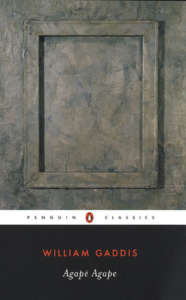We are what we consume. We thrive on a diet of inspiring ideas, deeds, and art, and languish when we lack emotional, intellectual, and spiritual nourishment. We are being polluted every day. And it’s not just the unhygienic water or the contaminated air or the nutrient-depleted food. It’s the unprecedented amounts of mindlessness and sleaze in media, entertainment, and politics. In my book The Art of Flourishing, I give a name to the seemingly never-ending dose of news scandals and coarse behavior of politicians, entertainers, athletes, and even religious leaders: cultural pollution.
One of the antidotes to cultural pollution is being exposed to uplifting ideals, people of character, moving works of art. But in an age of frequent decadence and stunning shortsightedness, there is often a dearth of vision and inspiration.
The late novelist William Gaddis was a source of such revelation and enrichment. Over the course of a long and distinguished career, Gaddis, winner of two National Book Awards and a MacArthur genius grant, strove to understand and name those forces and large-scale systems that condition our minds and hearts and hold us captive.
Do you ever feel society is like a vessel moving at warp speed without any direction? Do you believe that those in power don’t have your best interests in mind? Do you ever long for a world in which someone would either unmask the craziness posing as normality or validate your sense that the world is, in part, insane?
“Madness, it’s all madness,” says the morally outraged narrator of Gaddis’s Agapē Agape (Penguin Classics). What is so refreshing about reading Gaddis—though it takes effort—is his intrepid exploration of the madness we call ordinary life, his searing attack on the cowardice and chicanery that have led us astray as a culture.


In Agapē Agape, Gaddis reprises themes he pursued for nearly half a century. In this novel, his swan song, a man dying of cancer, hobbled by physical pain and the prednisone he takes for cancer (there are apparently significant autobiographical parallels), valiantly strives to order the mass of chaotic newspaper clippings, insights, and suggestive quotes that surround him into a coherent whole, so that he can complete his last testament. The book’s title refers to the Christian ideal of brotherly love and a world torn apart by shallow and topsy-turvy values.
Few are as deft or relentless as Gaddis in piercing and unmasking the illusions and “vast hallucination” of the craziness masquerading as sanity. It is refreshing and immensely validating to encounter someone who looks with blistering honesty at the matrix of lunacy we all must navigate. But Agapē Agape is not just the ranting of a dying narrator; it is an homage to the redemptive power of art—its capacity to give an uncompromising X ray into human potential, as well as human folly. Penetrating the mystifications and confusions that entrap us and offering an image of Michelangelo’s “self that could do more,” Agapē Agape points toward a better world, one characterized by creativity and healthy individuality and the intellectual and artistic communion of brave and courageous artists and thinkers unflinchingly confronting those forces that threaten civilization.
One useful way of countering the cultural pollution that threatens to overwhelm us is by cavorting with genius: spending time with people and art and ideas that challenge and inspire us, expand and humanize us. And then we might keep alive, and maybe even honor and extend, the brave ideas and profound artistic legacy that William Gaddis has bequeathed us.
Post Disclaimer
This content is for informational purposes only and does not constitute medical advice. Please consult a healthcare professional for any medical concerns.



